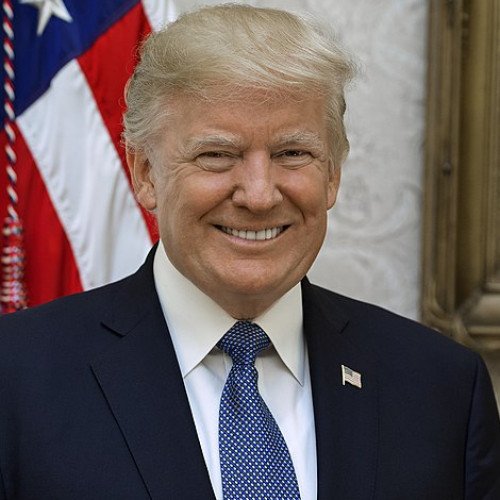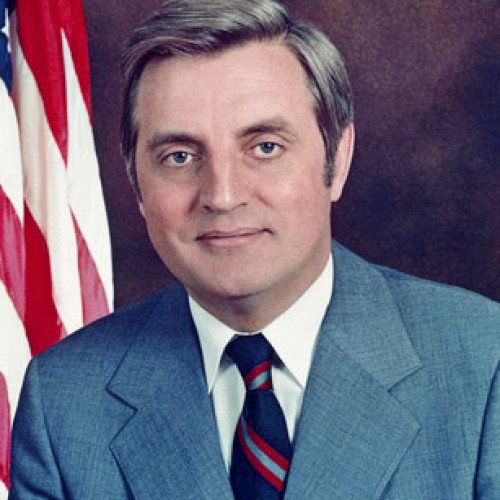Donald Trump VS Walter Mondale

Donald Trump
Donald John Trump (born June 14, 1946) is an American politician who was the 45th president of the United States from 2017 to 2021. Before entering politics, he was a businessman and television personality. Born and raised in Queens, New York City, Trump attended Fordham University for two years and received a bachelor's degree in economics from the Wharton School of the University of Pennsylvania. He became the president of his father Fred Trump's real estate business in 1971, which he renamed The Trump Organization; he expanded the company's operations to building and renovating skyscrapers, hotels, casinos, and golf courses. Trump later started various side ventures, mostly by licensing his name. Trump and his businesses have been involved in more than 4,000 state and federal legal actions, including six bankruptcies. He owned the Miss Universe brand of beauty pageants from 1996 to 2015, and produced and hosted the reality television series The Apprentice from 2004 to 2015. Trump's political positions have been described as populist, protectionist, isolationist and nationalist. He entered the 2016 presidential race as a Republican and was elected in an upset victory over Democratic nominee Hillary Clinton while losing the popular vote. He became the first U.S. president without prior military or government service. His election and policies have sparked numerous protests. Trump made many false and misleading statements during his campaigns and presidency, to a degree unprecedented in American politics. Many of his comments and actions have been characterized as racially charged or racist. During his presidency, Trump ordered a travel ban on citizens from several Muslim-majority countries, citing security concerns; after legal challenges, the Supreme Court upheld the policy's third revision. He enacted a tax-cut package for individuals and businesses, rescinding the individual health insurance mandate penalty of the Affordable Care Act (ACA). He appointed Neil Gorsuch, Brett Kavanaugh and Amy Coney Barrett to the Supreme Court. He reacted slowly to the COVID-19 pandemic, downplayed the threat, ignored or contradicted many recommendations from health officials, and promoted false information about unproven treatments and the availability of testing. In foreign policy, Trump pursued an America First agenda: he renegotiated the North American Free Trade Agreement (NAFTA) as the United States–Mexico–Canada Agreement (USMCA) and withdrew the U.S. from the Trans-Pacific Partnership trade negotiations, the Paris Agreement on climate change and the Iran nuclear deal. He imposed import tariffs which triggered a trade war with China, moved the U.S. embassy in Israel to Jerusalem and withdrew U.S. troops from northern Syria. He met three times with North Korean leader Kim Jong-un, but negotiations on denuclearization eventually broke down. A special counsel investigation led by Robert Mueller found that Trump and his campaign benefited from Russian interference in the 2016 presidential election, but did not find sufficient evidence to press charges of criminal conspiracy or coordination with Russia. Mueller also investigated Trump for obstruction of justice and his report neither indicted nor exonerated Trump on that offense. Trump later pardoned five people who were convicted as a result of the Russia investigation. After Trump solicited Ukraine to investigate his political rival Joe Biden, the House of Representatives impeached him in December 2019 for abuse of power and obstruction of Congress. The Senate, after refusing to hear witness testimony, acquitted him of both charges in February 2020. Trump lost the 2020 presidential election to Biden but refused to concede defeat. He attempted to overturn the results by making false claims of electoral fraud, pressuring government officials, mounting dozens of unsuccessful legal challenges and obstructing the presidential transition. Hours before the ceremonial counting of the electoral votes on January 6, 2021, Trump rallied his supporters and exhorted them to march to the Capitol, which they then stormed. Five deaths resulted, and Congress was evacuated. Seven days later, the House of Representatives impeached him again, for "incitement of insurrection", making him the only American federal officeholder to be impeached twice.
Statistics for this Xoptio

Walter Mondale
Walter Frederick "Fritz" Mondale (born January 5, 1928) is an American politician, diplomat and lawyer who served as the 42nd vice president of the United States from 1977 to 1981. A United States senator from Minnesota (1964–1976), he was the Democratic Party's nominee in the 1984 United States presidential election, but lost to incumbent Ronald Reagan in an Electoral College and popular vote landslide. Reagan won 49 states while Mondale carried his home state of Minnesota and the District of Columbia. In October 2002, Mondale became the last-minute choice of the Minnesota Democratic–Farmer–Labor Party to run for Senate after the death of Senator Paul Wellstone, but was defeated by Saint Paul Mayor Norm Coleman. Mondale became the oldest living former U.S. vice president after the death of George H. W. Bush in 2018. Mondale was born in Ceylon, Minnesota, and graduated from the University of Minnesota in 1951 after attending Macalester College. He then served in the United States Army during the Korean War before earning a law degree in 1956. He married Joan Adams in 1955. Working as a lawyer in Minneapolis, Mondale was appointed Minnesota Attorney General in 1960 by Governor Orville Freeman and was elected to a full term as attorney general in 1962 with 60% of the vote. He was appointed to the U.S. Senate by Governor Karl Rolvaag upon the resignation of Senator Hubert Humphrey following Humphrey's election as vice president in 1964. Mondale was elected to a full Senate term in 1966 and reelected in 1972, resigning in 1976 as he prepared to succeed to the vice presidency in 1977. While in the Senate, he supported consumer protection, fair housing, tax reform, and the desegregation of schools. Importantly, he served as a member of the Select Committee to Study Governmental Operations with Respect to Intelligence Activities ("Church Committee").In 1976, Jimmy Carter, the Democratic presidential nominee, chose Mondale as his vice-presidential running mate. The Carter–Mondale ticket defeated incumbent president Gerald Ford and his vice presidential running mate, Bob Dole. Carter and Mondale's time in office was marred by a worsening economy and they lost the 1980 election to Republicans Ronald Reagan and George H. W. Bush. In 1984, Mondale won the Democratic presidential nomination and campaigned for a nuclear freeze, the Equal Rights Amendment, an increase in taxes, and a reduction of U.S. public debt. His vice presidential nominee was Geraldine Ferraro, a Congresswoman from New York, the first female vice-presidential nominee of any major party. Mondale and Ferraro lost the election to the incumbents Reagan and Bush. After his defeat, Mondale joined the Minnesota-based law firm Dorsey & Whitney and the National Democratic Institute for International Affairs (1986–93). President Bill Clinton appointed Mondale United States Ambassador to Japan in 1993; he retired in 1996. In 2002, Mondale ran for his old Senate seat, agreeing to be the last-minute replacement for Democratic Senator Paul Wellstone, who died in a plane crash less than two weeks before the election. Mondale narrowly lost the race to Saint Paul mayor Norm Coleman. He then returned to working at Dorsey & Whitney and remained active in the Democratic Party. Mondale later took up a part-time teaching position at the University of Minnesota's Hubert H. Humphrey School of Public Affairs.